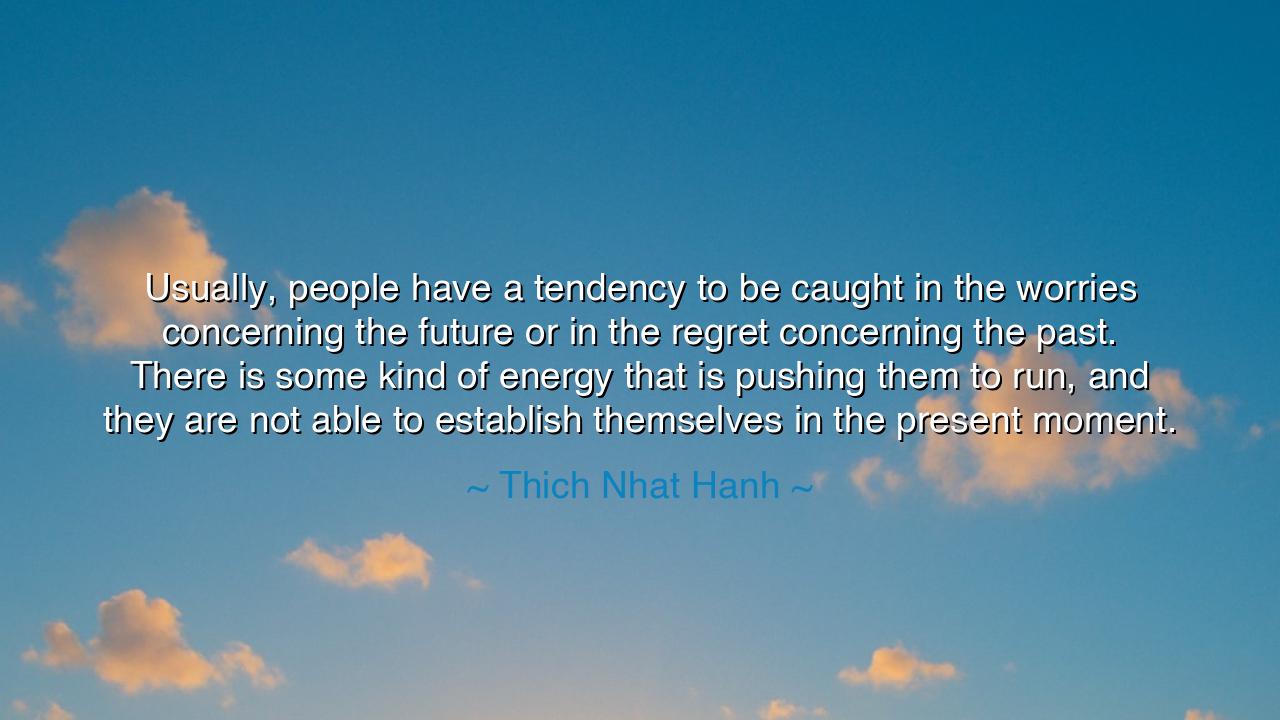
Usually, people have a tendency to be caught in the worries
Usually, people have a tendency to be caught in the worries concerning the future or in the regret concerning the past. There is some kind of energy that is pushing them to run, and they are not able to establish themselves in the present moment.






"Usually, people have a tendency to be caught in the worries concerning the future or in the regret concerning the past. There is some kind of energy that is pushing them to run, and they are not able to establish themselves in the present moment." These words by Thich Nhat Hanh speak to the human condition—the perpetual tug-of-war between the past and the future, which keeps us from fully experiencing the present. Thich Nhat Hanh describes a common struggle faced by many: the pull of regret for the past, which leaves us haunted by what we cannot change, and the anxiety of the future, which fills us with fear about what is yet to come. These concerns create a constant restlessness, a drive to run toward something, yet in doing so, we lose the very essence of life—the present moment.
This teaching resonates deeply with the ancient wisdom of Buddhism, of which Thich Nhat Hanh is a master. The Buddha himself emphasized the importance of mindfulness—the practice of being fully present in the moment, without the distraction of past regrets or future fears. In the Dhammapada, one of the most revered texts in Buddhism, the Buddha teaches, "Do not dwell in the past, do not dream of the future, concentrate the mind on the present moment." The Buddha recognized that suffering arises when we are disconnected from the present, when we become lost in our thoughts about what has been or what might be. The essence of peace and wisdom, he taught, comes from returning to the now, the only time we truly have.
The ancient Stoic philosophers, too, understood the power of living in the present moment. Marcus Aurelius, the Roman emperor and Stoic thinker, wrote in his Meditations, "Waste no more time arguing about what a good man should be. Be one." In these words, Marcus calls on us to act in the present, to stop being preoccupied with what has already happened or what could happen, and to focus instead on how we live in the here and now. The Stoics believed that the present moment is the only one over which we have true control. The future is uncertain, and the past cannot be undone, but our actions today shape the life we lead. Thich Nhat Hanh’s teachings echo this timeless wisdom, urging us to focus on the present with awareness and clarity.
Consider the life of Socrates, the Greek philosopher who, much like Thich Nhat Hanh, emphasized the importance of living in the present through self-reflection and self-awareness. Socrates spent his life asking people to examine their lives, not to dwell in the past or dream of some idealized future, but to focus on the actions and thoughts they could control at that very moment. Socrates taught that by living with awareness and intention in the present, one could cultivate a life of virtue and peace. His wisdom mirrors the message of mindfulness that Thich Nhat Hanh shares—that only by establishing ourselves in the present moment can we live a life of meaning and purpose.
In more recent history, the example of Nelson Mandela shows the power of staying grounded in the present, even in the face of overwhelming hardship. Mandela spent 27 years in prison, yet he refused to allow his past suffering to define him or his future actions. Instead, he chose to focus on reconciliation, healing, and the present opportunities to move forward with a vision for the future of South Africa. He understood, much like Thich Nhat Hanh, that to truly change and grow, one must let go of the grip of past sufferings and future uncertainties, embracing the present moment as the foundation for freedom and action.
The lesson we can take from Thich Nhat Hanh’s words is one of profound simplicity: to find peace and clarity, we must anchor ourselves in the present. The worries of the future and the regrets of the past will always pull at us, but it is our choice whether we allow them to dominate our minds. Mindfulness—the act of being present—gives us the ability to truly experience our lives as they unfold, rather than rushing through them in pursuit of what we think we should have or what might happen next. Like the Buddha, Marcus Aurelius, and Socrates, we are reminded that the only real time is the time in which we exist—the present moment.
In our own lives, we can begin practicing mindfulness by taking simple steps to return our focus to the present. Whether through meditation, deep breathing, or simply pausing throughout the day to reflect on what is happening right now, we can cultivate a deeper connection to the moment. Thich Nhat Hanh teaches us that true peace and wisdom come when we release the distractions of the past and future and live with full awareness of the present. By embracing the present moment, we give ourselves the freedom to act with clarity, compassion, and purpose, creating a life that is not led by regret or fear, but by the power of now.






AAdministratorAdministrator
Welcome, honored guests. Please leave a comment, we will respond soon